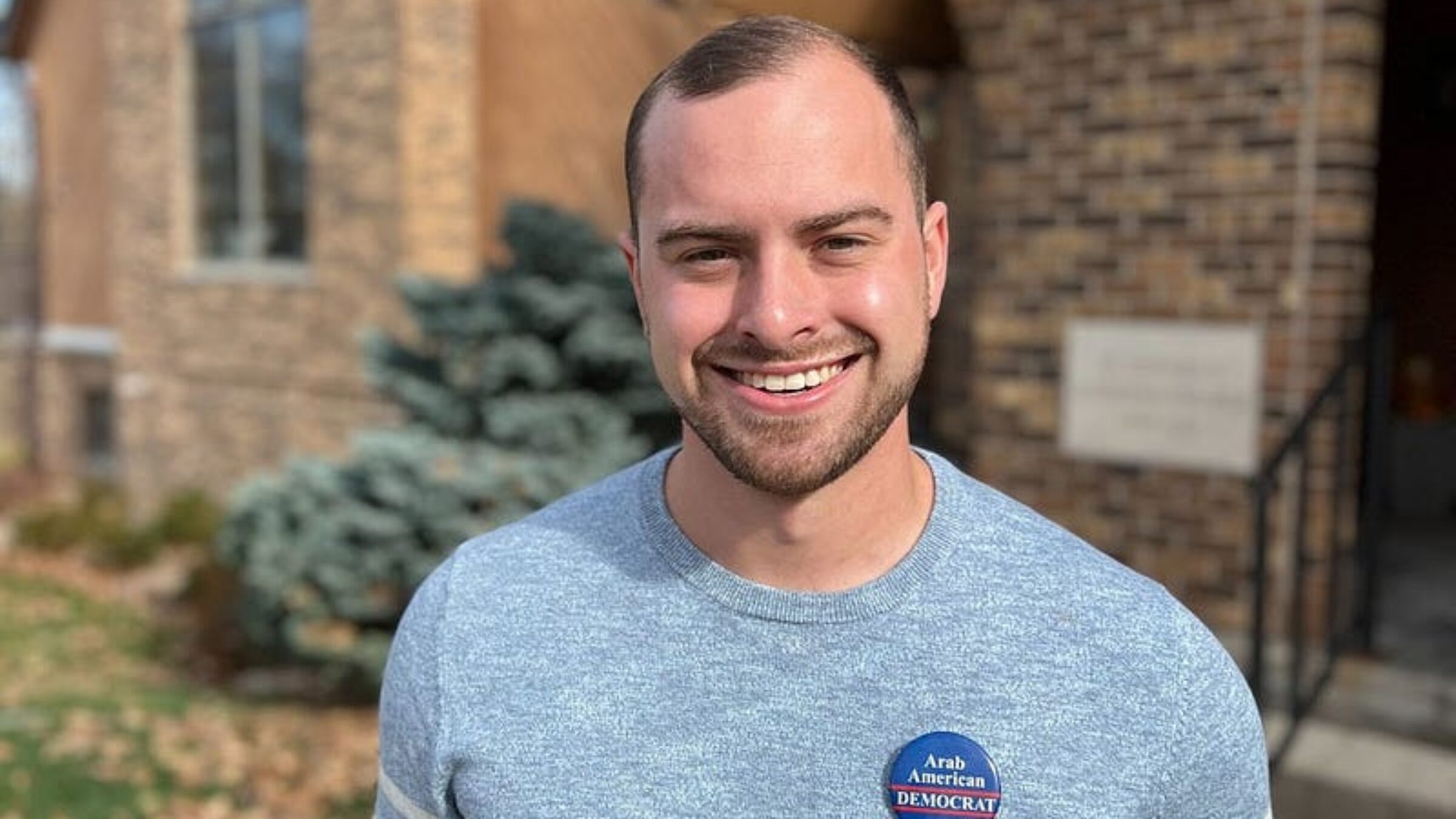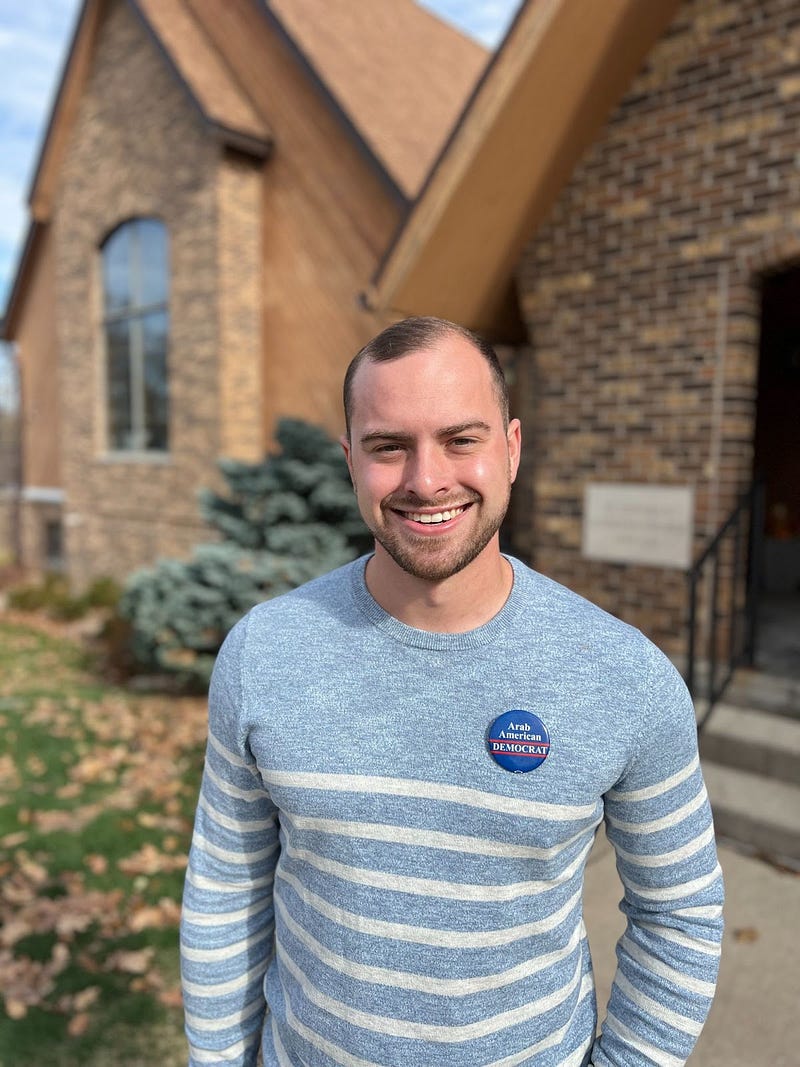Profiles of Effective Lawmakers: Rep. Sami Scheetz | Democrat – Iowa
April 21, 2023

Gen Z in the Statehouse: Meet Iowa’s first Arab-American Legislator
Rep. Sami Scheetz is a 26-year-old state representative in Iowa, who attributes his background in organizing and growing up in a diverse, blue-collar community as the driving forces for his politics and advocacy. Read on to learn more about Rep. Scheetz:

Meet Rep. Sami Scheetz (Age: 26)
“I was born and raised in Cedar Rapids, Iowa. My father is also from Cedar Rapids and works as an immigration defense lawyer, while my mom immigrated here from Damascus, Syria around 36 years ago. I attended public schools and was lucky enough to get a scholarship to go to Georgetown University in Washington, DC, to study international politics and history. I lived abroad in Argentina and Dubai, working for the State Department during my time there. After graduating from college, I decided to return to Iowa to be a part of positive change in my home state. I have been involved in community organizing and working on campaigns for almost a decade, starting in high school. After years of organizing, I wanted to have a voice of my own and be part of the rebuilding process for the Democratic Party in Iowa. I decided to run for office and won a contested general election. As a result, I became the first Arab-American state representative in Iowa’s history, which I am extremely proud of. Cedar Rapids has had a prominent Arab-American community for over 120 years, so it’s meaningful that for the first time our community has representation in Des Moines.”
As a young state representative, what do you think are the key issues facing your generation? How do you plan to address them in your role as a lawmaker in Iowa?
“When talking specifically about Iowa, I think the biggest problem is that we’ve had a decade of really extreme right-wing leadership in our state, and it’s made a lot of young people question whether they want to continue to live here. Personally, 90% of the people I grew up with in Cedar Rapids no longer live here. It is a major problem for Iowa to attract and retain young people, as they are the future of the state. We need to make Iowa a more welcoming and appealing place for them. This means creating good-paying jobs, providing an excellent public education system, and ensuring a sense of community that encourages people to put down roots and make Iowa their long-term home. Building a state that is attractive and accommodating to young workers is crucial for the prosperity of Iowa’s future.”
Can you talk about a particular piece of legislation that you have sponsored that you feel will have a significant positive impact on your constituents, especially those in your age demographic?
“In my short time here of just four months, I have been able to propose a piece of legislation this session that I am particularly proud of — the bipartisan free school lunch bill (IA HF575). This bill would make school breakfast and lunch free for students who are eligible to receive reduced-price meals under federal programs. Currently, there is a tiered system for reduced and free lunch in many states, including Iowa. During the pandemic, the federal government made school lunches free for all students regardless of income. My proposal aims to continue this program by providing free lunch to students who qualify for reduced-price meals, instead of paying the reduced rate. What I was most proud about is having 20 Republican cosponsors for the bill which is almost unheard of in the state legislature. The bill would help 22,000 kids in the state of Iowa not go hungry. So that’s the legislation that I’m definitely most proud of from this session.”
How do you balance your responsibilities as a state representative while not giving up your youth?
“It definitely has been an adjustment being in elected office and working in the capitol. Thankfully, there are a couple of other younger people in the legislature to learn from, but for the most part, it’s dominated by mostly older, white men. I think, as in any job, it takes time to adjust. However, having your life under the microscope is probably one of the most challenging things. Being in the job does teach you how to take that stuff into account. I think the biggest thing I’ve learned is that public service is more than just a job, it’s really a lifestyle. People in my community depend on me. Public service is a privilege and serving the people of Iowa makes it worth it.”
With so much polarization in politics today, how do you approach building coalitions and working across the aisle to accomplish your policy objectives?
“The school lunch bill is a great example of how to work with legislators across the aisle. I talked to them and explained why I thought the legislation was good for the state, and asked if they were willing to consider it. I was happily surprised that many people were open-minded. Building relationships across the aisle is a critical part of the job, especially in our current political climate where Republican support is essential to getting anything passed. I’ve worked hard to build and maintain these relationships and to explain why the legislation is good for everyday Iowans. I think building a better Iowa is some common ground we can all unite around.”
We have seen a lot of young people take action in their communities through organizing. For example, Gen Z’s first elected member of Congress, Maxwell Frost, comes from an organizing background as well. Can you discuss your experience working as an organizer and how that has influenced your approach to governing in Iowa?
“The experience was invaluable. I talk about this all the time… organizing was fundamental to my ability to be elected at this age. I wouldn’t have been able to do it if I had not had that experience. At the same time, it’s very different being a staffer than having to run for office yourself. As a candidate, you have to make a personal connection with people and convince them to support you. It’s more of a personal, one-on-one interaction, which can be challenging. Nonetheless — that kind of organizing and staff work is incredibly important, and I wouldn’t be able to do my job now without the incredible staff that I have at the capitol. I also know I wouldn’t have been as successful as I was at this job and as well prepared without the foundations of organizing — talking to volunteers, knocking doors, and making phone calls. It really is great work experience for this kind of role.”
What advice do you have for other young people who are interested in pursuing a career in politics and public service?
“Young people need to understand that elections, and the issues we are debating today are most important for our generation. For us, elections and party politics are not just about this year or the next; they are about the next few decades of our lives. As young people, we are the future of our states, and if we want our elected leaders to reflect our values and ideals, we must be active and engaged. This means organizing, knocking on doors, staying informed, showing up to rallies, and, most importantly, voting. I always encourage young people to stay informed and get involved in advocating for issues or candidates they are passionate about, whether it’s gun violence or any other issue that affects them. We need our generation to be part of the solution in shaping the future, not only in the state of Iowa but across the country.”
Do you know a Gen Z advocate or community leader and want their story to be heard? Submit their story at [email protected].






Join 1,900+ BIPARTISAN LEADERS NATIONWIDE
Be a part of a network of lawmakers committed to governing effectively, passing more representative public policy, and increasing public trust in democracy.